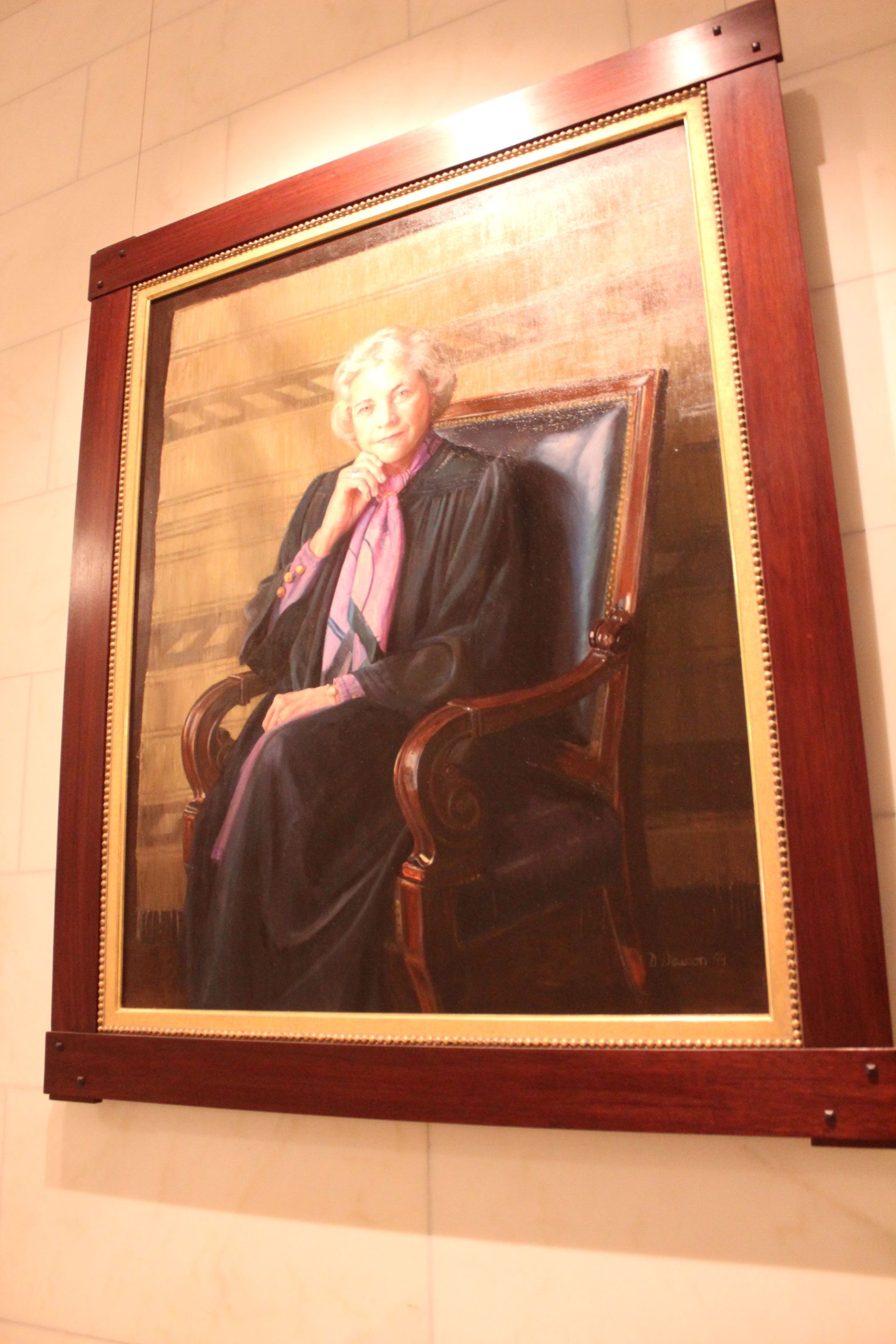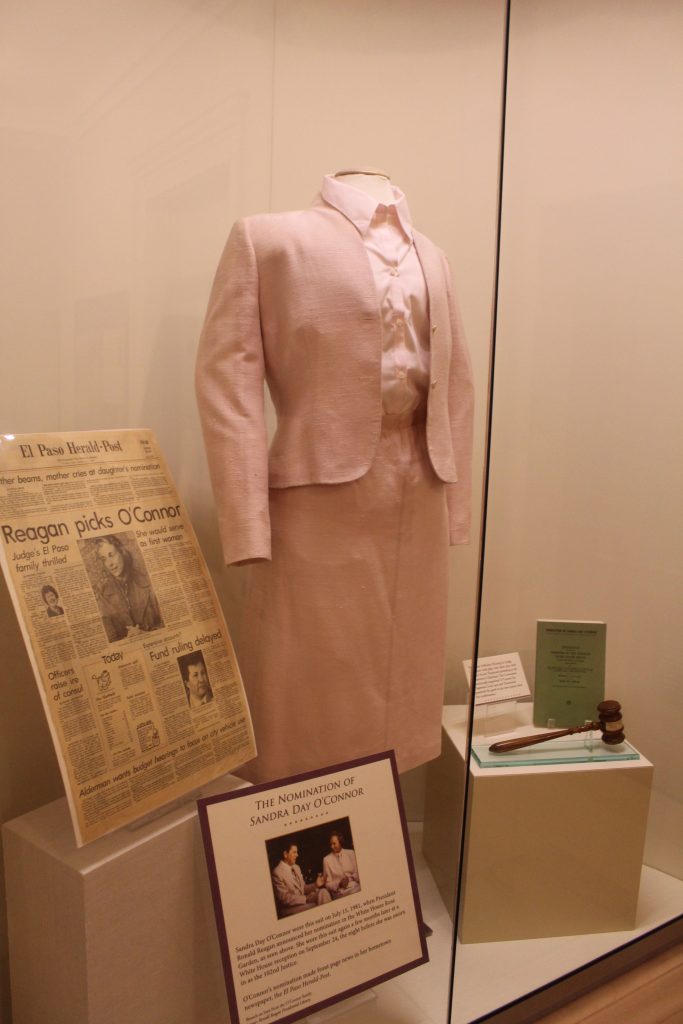Justice Sandra Day O’Connor Memorialized at the National Cathedral

WASHINGTON — Retired Supreme Court Justice Sandra Day O’Connor, the first woman ever to serve on the nation’s highest court, was memorialized Tuesday during a funeral service at the National Cathedral.
During the service, which was invitation-only, but livestreamed, O’Connor was eulogized by both President Joe Biden and Chief Justice John Roberts.
Biden recalled being the ranking member on the Senate Judiciary Committee the day it voted to confirm O’Connor’s nomination.
“Announcing her nomination earlier that summer, President Reagan described her as, and I quote, ‘a person for all seasons.’ And it was a person for all seasons we saw in that hearing and the Americans and the world would see through her extraordinary service as a justice and, I might add, as a citizen,” Biden said.
“Gracious and wise, civil and principled, Sandra Day O’Connor, a daughter of the American West, was a pioneer in her own right, breaking down the barriers in the legal and political worlds and the nation’s consciousness,” he continued.
“To her, the Supreme Court was bedrock — the bedrock of America. It was a vital, a vital line of defense for the values and the vision of our republic, devoted not to the pursuit of power for power’s sake but to make real the promise of America — the American promise that holds that we’re all created equal and deserve to be treated equally throughout our lives.
“The high court, she said in her opening statement, and I quote, ‘is the body to which all Americans look for the ultimate protection of their rights. It is the United States Supreme Court that we all turn to when we seek that which we want most from our government: equal justice under law.’ End of quote,” the president said.
“Equal justice under law is the noblest aspiration of humankind and the aspiration of Sandra Day O’Connor, one that she pursued her whole life,” he continued.
As he continued, the president recalled that O’Connor was the last justice to have held elected office.
As such, he said, “She was especially conscious of the law’s real impact on people’s lives.
“One need not agree with all her decisions in order to recognize that her principles were deeply held and of the highest order — and that her desire for civility was genuine,” he said. “And her trust in the capacity of human institutions to make life better is what this world was abiding.
“And how she embodied such attributes under such pressure and scrutiny helped empower generations of women in every part of American life, including the court itself — helping to open doors, secure freedoms and prove that a woman can not only do anything a man can do but, many times, do it a heck of a lot better.”
Biden also spoke of O’Connor’s abiding concern about civics, saying the late justice, a product of a region of “individualists, adventurers and entrepreneurs,” knew no person is an island.
“In the fabric of our nation, we are all inextricably linked. And for America to thrive, Americans must see themselves not as enemies, but as partners in the great work of deciding our collective destiny. That’s the essence of our national experience — the sacred cause of democracy she devoted her life to, one that we must continue.”
In his eulogy, Chief Justice John Roberts Jr. described his former colleague as a pioneering force whether it came to her service on the bench or in the example she set for generations of women.
“It has been said that the Supreme Court is like a family, a family composed entirely of in-laws,” the chief justice said, eliciting laughter from the attendees.
At the same time, he said, O’Connor was up to the challenges that might pose.
“She had to ignore slights and work to bring people together in social, professional and political life,” Roberts said, adding later that her approach, whether in public or in private, was to focus on the goal at hand, and “simple and direct, get it done.”
“Her leadership shaped the legal profession, making it obvious that judges are both women and men,” the chief justice continued. “She was so successful that the barriers she broke down are almost unthinkable today but not so in her lifetime.”
The funeral at the National Cathedral came a day after Vice President Kamala Harris, the late justice’s law clerks, members of Congress and the public paid respects to O’Connor as she lay in repose in the Great Hall of the Supreme Court on Monday.
During a private ceremony at the court attended by all nine sitting justices and retired Justice Anthony Kennedy, Justice Sonia Sotomayor, the third woman named to the Supreme Court, praised O’Connor as a role model, saying she personified the notion that “women could take on any challenge” and that she was someone who could “hold her own in spaces dominated by men” and “could do so with grace.”
“The nation was well served by the steady hand and intellect of a justice who never lost sight of how the law affected ordinary people,” Sotomayor said.
O’Connor was nominated to the Supreme Court by President Ronald Reagan in August 1981 and unanimously confirmed by the Senate a month later.
Four decades later, four other women have followed her to the Supreme Court. They are the late Ruth Bader Ginsburg, the second woman named to the nation’s highest court, the aforementioned Sotomayor, Elena Kagan, Amy Coney Barrett and Ketanji Brown Jackson.
The current gender split on the Supreme Court is 5-4, with men in the majority.
A self-described moderate conservative, O’Connor spent much of her 24-year tenure on the court as a crucial swing vote on divisive cases.
One that would haunt her — much to her surprise — was her vote on Bush v. Gore, which effectively ended Al Gore’s hope to become president.

O’Connor joined four other justices on Dec. 12, 2000, to block a then-ongoing recount of votes in Florida, the court holding that the use of different standards of counting in different counties violated the equal protection clause of the U.S. Constitution.
A number of legal scholars, at the time and since, have argued that O’Connor should have recused herself from the case, citing several media reports that she became upset when CNN and other news organizations initially announced that Gore had won Florida.
Her husband, John Jay O’Connor, tried to explain his wife’s reaction by saying Gore’s victory would mean his wife would have to wait at least four more years before retiring to Arizona.
The explanation did not mollify the justice’s critics, however, and she later expressed surprise that the decision became controversial.
According to an article published by Vanity Fair in October 2004, the justice was rebuked by playwright Arthur Miller when he found her at the Kennedy Center celebrating her 71st birthday.
The same piece said a few people in Washington stopped shaking her hand when they encountered her.
Though always reserved, O’Connor finally offered her own assessment of her time on the Supreme Court in “Out of Order,” a 2013 collection of essays she penned on the court’ history.
“I was a justice for over a quarter century, and after hearing a few thousand cases, I think I began to get the hang of it,” she wrote. “Moreover, because I long ago stopped caring what politicians and the media say about me, I was also better able to make the hard decisions that might make my powerful neighbors mad.”
O’Connor was born and raised on her family’s cattle ranch in southeastern Arizona, and later graduated third in her class at Stanford Law, two places behind her future Supreme Court colleague, Chief Justice William Rehnquist.
O’Connor met her husband while in law school. He died in 2009 of complications from Alzheimer’s disease.
Before joining the Supreme Court, O’Connor served in the Arizona state Senate and, upon becoming the chamber’s majority leader, was the first woman to serve in the role for any state Senate.
She began her career in the judiciary in 1974 when she was elected to the Maricopa County Superior Court and then was a judge on the Arizona Court of Appeals.
O’Connor retired from the Supreme Court in 2006 at the age of 75 to take care of her husband following his Alzheimer’s diagnosis, but remained an active advocate for civics education, a devotion that ultimately led her to found the group iCivics in 2009.
That same year, President Barack Obama awarded her the Presidential Medal of Freedom, the nation’s highest civilian honor.
O’Connor died Dec. 1 at the age of 93 due to complications related to advanced dementia and a respiratory illness.
Dan can be reached at [email protected] and at https://twitter.com/DanMcCue
























